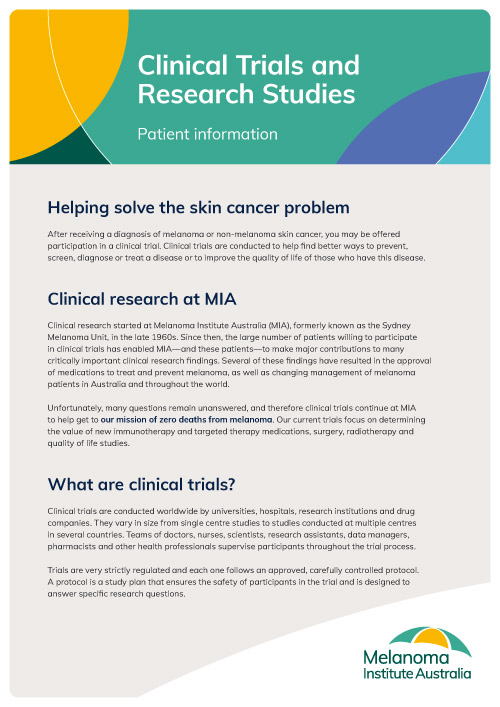Clinical trials are a crucial part of the research undertaken at Melanoma Institute Australia. Coordinated from the Poche Centre in Wollstonecraft and conducted at locations throughout our network, these trials help us find better ways to prevent, diagnose and treat melanoma, as well as help improve the quality of life of melanoma patients.

All of MIA’s clinical trials follow a strict protocol approved by a Human Research Ethics Committee. This committee ensures that the rights, safety and wellbeing of participants are protected throughout the trial.
Patients – To read more about participating in Clinical Trials see here.
Clinicians – For information on referring patients to an MIA Clinical Trial see here.
Download our Clinical Trial brochure to find out more about clinical trials.
Current Clinical Trials
Please use the Stage tabs below to find a suitable clinical trial being run at MIA. Includes Melanoma and Non-Melanoma trials which are currently recruiting and trials that will open soon.
MCC-Neo
The goal of this clinical trial is to test neoadjuvant dual immunotherapy in Merkel cell carcinoma with the aim to improve recurrence-free survival.
Diagnosis: Non-Melanoma
Stage: I /II/ III resectable
Setting: Neoadjuvant
Status: Recruiting
Trial ID: NCT06151236
More info >
MCC-Neo
The goal of this clinical trial is to test neoadjuvant dual immunotherapy in Merkel cell carcinoma with the aim to improve recurrence-free survival.
Diagnosis: Non-Melanoma
Stage: I /II/ III resectable
Setting: Neoadjuvant
Status: Recruiting
Trial ID: NCT06151236
More info >
SCC-Neo
The goal of this study is to test neoadjuvant therapy with the dual inhibition of Programmed cell death protein 1 (PD-1) and lymphocyte activation gene 3 (LAG-3) immune checkpoint pathways in a cohort of treatment-naïve, resectable stage II to IV cutaneous squamous cell carcinoma on the pathological response rate (pCR) and recurrence-free survival.
Diagnosis: Non-Melanoma
Stage: II/ III / IV resectable
Setting: Neoadjuvant
Status: Recruiting
Trial ID: NCT06288191
More info >
KINNATE
A Study to Evaluate KIN-2787 in Participants With BRAF and/or NRAS Mutation Positive Solid Tumors.
Diagnosis: Melanoma and other solid tumours
Stage: III/IV Unresectable
Setting: Metastatic (immunotherapy relapse)
Status: Recruiting
Trial ID: NCT04913285
More info >
Moderna mRNA-4359
Study of mRNA-4359 Administered Alone and in Combination With Immune Checkpoint Blockade in Participants With Advanced Solid Tumors.
Diagnosis: Melanoma
Stage: III/IV unresectable
Setting: Metastatic (immunotherapy relapse)
Status: Recruiting
Trial ID: NCTNCT05533697
More info >
Immunocore TEBE-AM
To evaluate the efficacy and safety of tebentafusp-based regimens (tebentafusp monotherapy and in combination with anti-PD1) vs investigator choice (including clinical trials of investigational agents, salvage therapy per local standard of care (SoC), best supportive care (BSC)) on protocol survivor follow up) in patients with advanced non-ocular melanoma.
Diagnosis: Melanoma
Stage: III / IV unresectable
Setting: Metastatic (immunotherapy relapse)
Status: Recruiting
Trial ID: NNCT05549297
More info >
Regeneron 2208
A Trial to Learn if Fianlimab and Cemiplimab Are Safe and Work Better Than Anti-PD1 Alone in Adult Participants With Resectable Stage III and IV Melanoma.
Diagnosis: Melanoma
Stage: III & IV resectable
Setting: Neoadjuvant
Status: Recruiting
Trial ID: NCT06190951
More info >
MCC-Neo
The goal of this clinical trial is to test neoadjuvant dual immunotherapy in Merkel cell carcinoma with the aim to improve recurrence-free survival.
Diagnosis: Non-Melanoma
Stage: I /II/ III resectable
Setting: Neoadjuvant
Status: Recruiting
Trial ID: NCT06151236
More info >
SCC-Neo
The goal of this study is to test neoadjuvant therapy with the dual inhibition of Programmed cell death protein 1 (PD-1) and lymphocyte activation gene 3 (LAG-3) immune checkpoint pathways in a cohort of treatment-naïve, resectable stage II to IV cutaneous squamous cell carcinoma on the pathological response rate (pCR) and recurrence-free survival.
Diagnosis: Non-Melanoma
Stage: II/ III / IV resectable
Setting: Neoadjuvant
Status: Recruiting
Trial ID: NCT06288191
More info >
Immunocore PRISM
This is a phase 3, randomized, controlled study of brenetafusp (IMC-F106C) plus nivolumab compared to standard nivolumab regimens in HLA-A*02:01-positive participants with previously untreated advanced melanoma.
Diagnosis: Melanoma
Stage: III / IV unresectable
Setting: Metastatic (first line)
Status: Recruiting
Trial ID: NCT06112314
More info >
Immunocore PRAME P115C
Phase 1 trial to assess the safety and clinical activity of IMC-P115C in HLA-A*02:01-positive patients with advanced solid tumors that express PRAME.
Diagnosis: Melanoma
Stage: III / IV unresectable
Setting: Metastatic (HLA and PRAME +ve)
Status: Recruiting
Trial ID: NCT07156136
More info >
STRAND STX-001-01
Phase 1/2 Study of Intratumoral Injection of STX-001 in Advanced Solid Tumors as Monotherapy or in Combination With Pembrolizumab.
Diagnosis: Melanoma
Stage: III / IV unresectable
Setting: Metastatic (intralesional)
Status: Recruiting
Trial ID: NCT06249048
More info >
V940-012
A Clinical Study of V940 and Pembrolizumab (MK-3475) in People With Melanoma (V940-012/INTerpath-012).
Diagnosis: Melanoma
Stage: III / IV unresectable
Setting: Metastatic (first line)
Status: Recruiting
Trial ID: NCT06961006
More info >
MSLT III
The Multicentre Selective Lymphadenectomy Trial – 3 (MSLT-3). The goal of this clinical trial is to demonstrate that there is no difference (non-inferiorty) in the 2 year recurrence-free survival (RFS) between 2 different surgical approaches for clinical Stage III melanoma – selective index lymph node resection (ILN) or the standard of care therapeutic lymph node dissection (TLND). The secondary aim is to assess if patients who are managed without TLND will have a reduction in surgical complications (less wound problems & lymphoedema), an improved quality of life, at a lower healthcare utilisation.
Diagnosis: Melanoma
Stage: III B-D
Setting: Surgical/neoadjuvant
Status: Recruiting
Trial ID: NCT07049276
More info >
BNT326-01
A Clinical Study to Test if an Investigational Treatment called BNT326 is safe and potentially beneficial when used alone or in combination with other investigational treatments Such as BNT327, for people with advanced malignant tumors.
Diagnosis: Melanoma
Stage: III & IV resectable
Setting: Metastatic
Status: Recruiting
Trial ID: NCT07070232
More info >
ABC-X
A phase II, open label, randomised trial of ipilimumab and nivolumab with concurrent intracranial stereotactic radiotherapy versus ipilimumab and nivolumab alone in patients with asymptomatic, untreated melanoma brain metastases.
Diagnosis: Melanoma
Stage: IV Brain metastases
Setting: Metastatic (first line)
Status: Recruiting
Trial ID: NCT03340129
More info on clinicaltrials.gov >
See our ABC-X Clinical Trial page >
KINNATE
A Study to Evaluate KIN-2787 in Participants With BRAF and/or NRAS Mutation Positive Solid Tumors
Diagnosis: Melanoma and other solid tumours
Stage: III/IV Unresectable
Setting: Metastatic (immunotherapy relapse)
Status: Recruitment Paused
Trial ID:NCT04913285
More info >
Moderna mRNA-4359
Study of mRNA-4359 Administered Alone and in Combination With Immune Checkpoint Blockade in Participants With Advanced Solid Tumors
Diagnosis: Melanoma
Stage: III/IV unresectable
Setting: Metastatic (immunotherapy relapse)
Status: Recruiting
Trial ID: NCTNCT05533697
More info >
Immunocore TEBE-AM
To evaluate the efficacy and safety of tebentafusp-based regimens tebentafusp monotherapy and in combination with anti-PD1) vs investigator choice (including clinical trials of investigational agents, salvage therapy per local standard of care (SoC), best supportive care (BSC)) on protocol survivor follow up) in patients with advanced non-ocular melanoma.
Diagnosis: Melanoma
Stage: III / IV unresectable
Setting: Metastatic (immunotherapy relapse)
Status: Recruiting
Trial ID: NNCT05549297
More info >
SCC-Neo
The goal of this study is to test neoadjuvant therapy with the dual inhibition of Programmed cell death protein 1 (PD-1) and lymphocyte activation gene 3 (LAG-3) immune checkpoint pathways in a cohort of treatment-naïve, resectable stage II to IV cutaneous squamous cell carcinoma on the pathological response rate (pCR) and recurrence-free survival.
Diagnosis: Non-Melanoma
Stage: II/ III / IV resectable
Setting: Neoadjuvant
Status: Recruiting
Trial ID: NCT06288191
More info >
Immunocore PRISM
This is a phase 3, randomized, controlled study of brenetafusp (IMC-F106C) plus nivolumab compared to standard nivolumab regimens in HLA-A*02:01-positive participants with previously untreated advanced melanoma.
Diagnosis: Melanoma
Stage: III / IV unresectable
Setting: Metastatic (first line)
Status: Recruiting
Trial ID: NCT06112314
More info >
Immunocore PRAME P115C
Phase 1 trial to assess the safety and clinical activity of IMC-P115C in HLA-A*02:01-positive patients with advanced solid tumors that express PRAME.
Diagnosis: Melanoma
Stage: III / IV unresectable
Setting: Metastatic (HLA and PRAME +ve)
Status: Recruiting
Trial ID: NCT07156136
More info >
STRAND STX-001-01
Phase 1/2 Study of Intratumoral Injection of STX-001 in Advanced Solid Tumors as Monotherapy or in Combination With Pembrolizumab.
Diagnosis: Melanoma
Stage: III / IV unresectable
Setting: Metastatic (intralesional)
Status: Recruiting
Trial ID: NCT06249048
More info >
AXIOM
The purpose of this research is to evaluate the addition of radiotherapy to the standard immunotherapy drugs that are given to patients with advanced or metastatic melanoma that has spread to other parts of the body.
Diagnosis: Melanoma
Stage: IV unresectable
Setting: Metastatic (first line)
Status: Recruiting
Trial ID: NCT06767306
More info >
Regeneron 2208
A Trial to Learn if Fianlimab and Cemiplimab Are Safe and Work Better Than Anti-PD1 Alone in Adult Participants With Resectable Stage III and IV Melanoma.
Diagnosis: Melanoma
Stage: III & IV resectable
Setting: Neoadjuvant
Status: Recruiting
Trial ID: NCT06190951
More info >
V940-012
A Clinical Study of V940 and Pembrolizumab (MK-3475) in People With Melanoma (V940-012/INTerpath-012).
Diagnosis: Melanoma
Stage: III / IV unresectable
Setting: Metastatic (first line)
Status: Recruiting
Trial ID: NCT06961006
More info >
BNT326-01
A Clinical Study to Test if an Investigational Treatment called BNT326 is safe and potentially beneficial when used alone or in combination with other investigational treatments Such as BNT327, for people with advanced malignant tumors.
Diagnosis: Melanoma
Stage: III & IV resectable
Setting: Metastatic
Status: Recruiting
Trial ID: NCT07070232
More info >
Clinical Trial Types and Phases
Clinical Trial Types
The U.S. National Institutes of Health (NIH) classify clinical trials into five types as follows:
1. Treatment Trials– the most common type of trial involving testing experimental treatments such as new drug combinations or new approaches to surgery or radiotherapy.
2. Prevention Trials – test new ways to prevent disease and disease recurrence.
3. Screening Trials – test the most effective way to detect a disease.
4. Diagnostic Trials– conducted to find better ways to diagnose disease.
5. Quality of Life Trials (or Supportive Care Trials)– explore ways to improve the comfort and quality of life for people with a disease.
Clinical Trial phases
New treatments must go through three “phases” of trials before they can be considered for use;
- Phase 1 – Involves only a small number of participants where a range of dosage levels are tested and any side effects analysed.
- Phase 2 – Involves a larger group of participants where a more detailed evaluation of safety and effectiveness is conducted.
- Phase 3 – Involves a much larger group of participants where the experimental treatment is formally compared with the current standard treatment by randomly allocating each treatment across the test group.Random treatment allocation is necessary in Phase 3 trials to ensure the treatments can be compared without bias. Neither the patient nor the trial team can choose which treatment is received. If the trial involves a new drug it is possible that the patient and the trial team might not be told which treatment group you are in; this is known as blinding and is used to prevent bias. In some trials experimental treatments are compared with a placebo – an inactive pill, liquid or powder that has no treatment value. Patients are informed if the trial being considered is blinded or placebo controlled.
